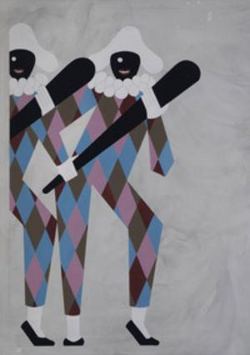Considering the free flow of cultural influences, why is it that American artists engage the carnival theme with gamey vulgarities, while Europeans produce high-toned spectacle? Extras from splatter and noir movies populate American work, and the gilded glide through their European equivalents.
Case in point: Enrico David, finalist for this year’s Turner Prize and recently at the Seattle Art Museum thanks to SAM curator Michael Darling.
Born in Italy and living in London, David is a slippery devotee of magical thinking. Even when working alone, he creates the illusion of a merry band. Whether he’s embroidering paintings, turning costumes into lampshades and images of black coat racks (with pert breasts) into a chorus to accompany his own version of clowns, his meanings are polished but not fixed.
 His figures relate to the past but have shed its baggage. He hopes to enchant the world, not change it. For him the world really is a stage, and he refashions its works (furniture, clothing, commercial illustration, puppet theater, advertisements, street lights and party favors) into his souffle of a drama.
His figures relate to the past but have shed its baggage. He hopes to enchant the world, not change it. For him the world really is a stage, and he refashions its works (furniture, clothing, commercial illustration, puppet theater, advertisements, street lights and party favors) into his souffle of a drama.
His rigor saves him from whimsy, and his acute visual intelligence from trivia.
In an essay in Frieze, which he opened by declaring, “My
name is not Enrico David,” he spoke for all artists who do not want to
describe their work or have it described for them.
I’m not tour guide, toastmaster, apologist or surrogate. If you are
after meaning of fixed value, then you’re in the wrong shop. Meaning is
a proposition, not an assurance. Meaning is also the name of a nomadic
tribe who offer wares to anyone open to conversation.
That conversation is a silent one between the viewer and artwork. In
his insistence that his work not be explained away, he most resembles
those artists who made their mark a century ago. They were purists,
too.
Other finalists are Roger Hiorns, Lucy Skaer and Richard Wright. Winner to be announced Dec. 7. More here.



Leave a Reply